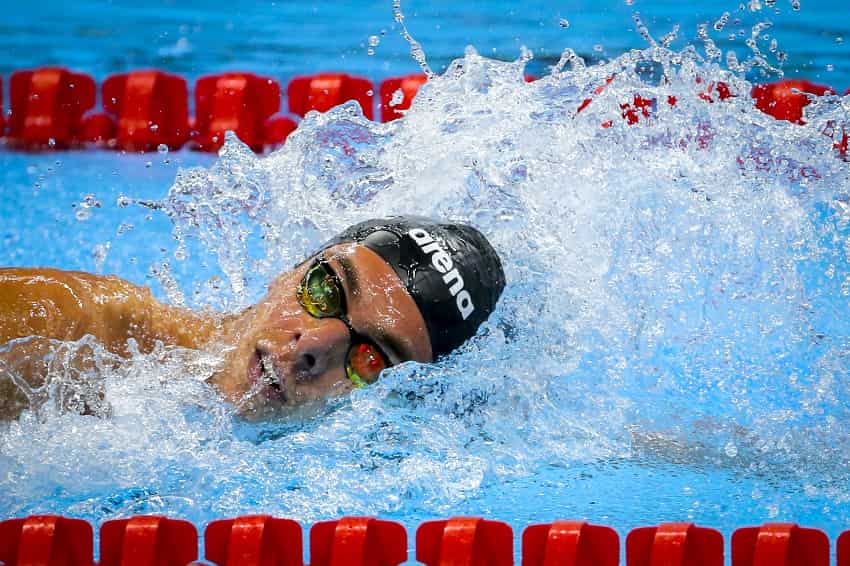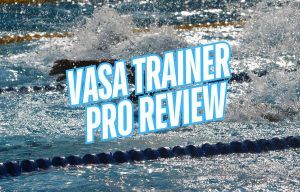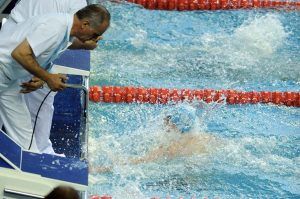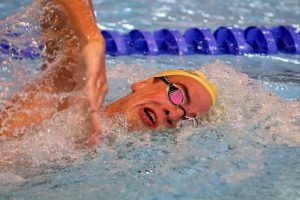Ready to unleash your inner Arnold while also adding power to your swimming? Here’s why you should be incorporating dumbbell bench press into your strength training regimen.
When it comes to getting all jacked and stuff there is probably no exercise more popular than the bench press.
(Well, maybe bicep curls…)
It’s popularity is reasonable–it’s exceptionally effective at developing brute upper body strength from your shoulders, chest, even your back when done properly.
But for swimmers, the barbell bench press presents a couple conflicting problems:
- First–we want the strength and power that comes with it, but not at the cost of losing scapular stability and gaining muscle mass that doesn’t serve our needs in the water.
- And two, what compounds the problem is when we are doing exercises out of the water that don’t necessarily translate to what we are doing in the pool, while the workout routine also leaves us so wrecked and sore that our swim practices suffer. (And worst case scenario, injured.)
So what do we do if we want those strength gainz, but don’t want to sacrifice our time in the water?
By ditching the barbell and picking up a set of dumbbells.
Here are five arguments for why swimmers should be using DB’s for bench press work:
1. The practical advantages of dumbbells.
Before we get into the specific reasons the dumbbell bench press is particularly awesome for swimmers, there are some practical benefits of training with dumbbells, especially with groups of swimmers:
More accessible.
My local gym has a couple flat benches for barbell pressing. And they are almost always occupied, or at the very least being swarmed or used as a rest bench.
(My gym leaves a bit to be desired at times, I’ll admit it.)
It’s the same deal with machines—not only do they take up a lot of room for one specialized movement/exercise, but only one athlete can use it at a time.
Dumbbells, on the other hand, are particularly useful for groups of swimmers. Instead of rotating through a squad of swimmers on a couple of benches, a group of swimmers can perform the exercise simultaneously in a relatively small space.
Safer.
On those sets where you are approaching failure a certain amount of panic begins to set in—you are holding a fully loaded barbell over your chest, after all.
Dropping it would at the very least make a butt-ton of noise, at worst cause serious injury to your sternum.
Dumbbells can be safely dropped when you approach exhaustion, which means that you can push yourself with relative confidence.
Quicker learning curve.
Teaching someone how to perform a clean, a complicated compound exercise, is easier with a dumbbell than on a barbell. Same thing with bench.
According to a majority of strength and conditioning coaches, teaching an athlete how to perform a new movement generally happens faster with dumbbells.
2. Doing DB bench unilaterally will blast away at your core.
Three-time Olympian Nathan Adrian is a total monster in the gym. According to his teammates he’s maxed out the DB’s in the Cal weight room, performing 2 x 160lbs on the dumbbell bench.
(Sweet molasses!)
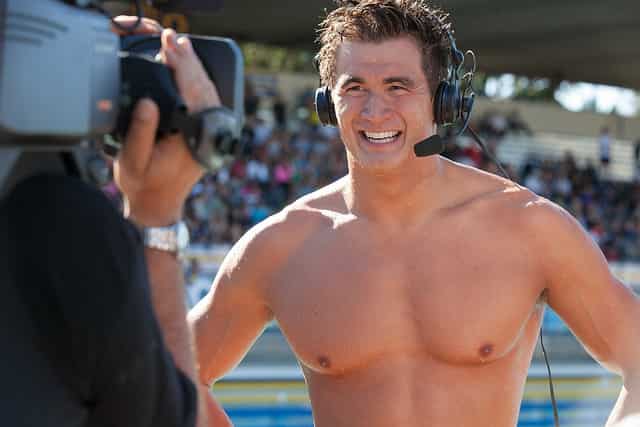
Swimmers should know by now the importance and benefits of having a powerful core: it helps us maintain proper body position in the water, helps to reduce drag, and acts as the power generator for our kicking.
Single arm DB benching will cause your trunk stabilizers to work overtime in order to balance yourself against the weight and the movement of the exercise.
After all, doing the movement with a moderate amount of weight, and not having your core fully engaged, will mean that you roll right off the side of the bench. (So yeah…don’t do that, k?)
See Also: The Top 6 Core Exercises for Competitive Swimmers
3. Alternating arm bench will help power you to a stronger stroke.
Coaches and trainers talk often about sport-specific training. Alternating arm bench press, especially for you freestylers out there, comes close to being as sport-specific as it gets.
After all, you pull through the water one arm at a time, utilizing the front of your shoulders and your chest to perform a devastating arm pull.
You can simulate the general nature of the movement and strengthen the muscles involved–while also giving your core a good punishing–by alternating pushing the DB’s into the air.
Dumbbell bench press becomes a more complex motor activity as you are forced to control two different independent implements on the bench. Single arm and alternating benching provides an element of instability and difficulty that gives you a training stimulus that more reflects your swimming.
4. It will help you target and improve imbalances.
The muscle imbalances that swimmers carry are hard to hide. All you have to do is sit behind one—invariably one lat protrudes a little wider than the other.
This comes from having a dominant side that we then spend thousands of hours and yards breathing towards (just another argument for breathing bilaterally), strengthening one side while the other struggles to keep up.
If you really want to see those muscle imbalances in action load up a bar and try to push or pull completely evenly. One side of the bar will rise or descend faster than the other.
With a bar we can compensate for this asymmetry–which presents its own sets of problems (ahem, further injury). With dumbbells it’s a lot harder to hide.
The DB can help you identify and correct these muscle imbalances.
5. You can use a more natural grip.
Back on the safety thing a bit here—when an NCAA division I team was followed for a few years researchers found that nearly half the injuries incurred were from doing dryland or strength training.
This isn’t surprising—swimmers coming into NCAA programs have an uneven history of weight training, whether it is because of limited access to coaching or facilities, or a coach who doesn’t subscribe to crushing iron.
Whichever the case, with a ton of injuries taking place on the dry side of training it’s worth making lifting safer.
By using dumbbells for bench pressing swimmers can assume a more neutral, natural grip. This restricts the elbows from flaring out and prevents it from abducting and impinging (ouch).
With swimmer’s shoulder being such a prevalent problem on pool decks everything should be done to minimize injury. As someone who struggled with shoulder pain for years I could do DB bench using a grip that didn’t cause my shoulder further aggravation.
The Next Step
Now that we have covered the reasons the dumbbell bench is so rad, you might be tempted to forego the barbell for life. But I wouldn’t go that far.
The barbell has a place in your lifting routine, but its prominence depends on what you want to achieve in the gym and in the pool.
A properly designed strength training program makes effective use of both.
Sure, you will lift a bit less with dumbbells versus a barbell, but you will have the benefits of greater range of motion, a more natural grip, while performing a lift that is directly applicable to what you want to do in the water.
More Stuff Like This:
- Does Doing Dryland Help Improve Sprint Swimming Performance? We look at what kind of resistance training is most effective at helping swimmers improve 50m sprint performance.
- Weight Training for Swimmers: What You Need to Know. A group of top NCAA division I strength and conditioning specialists stop by to share their favorite piece of wisdom for swimmers in the weight room.

